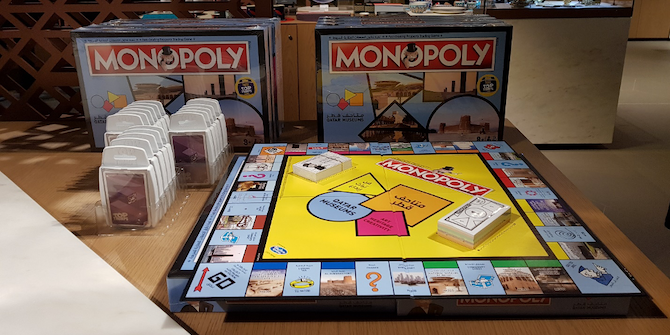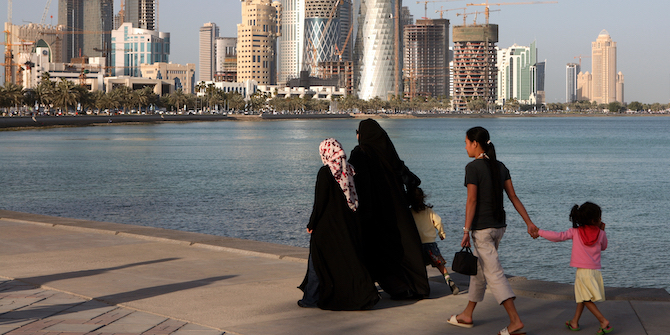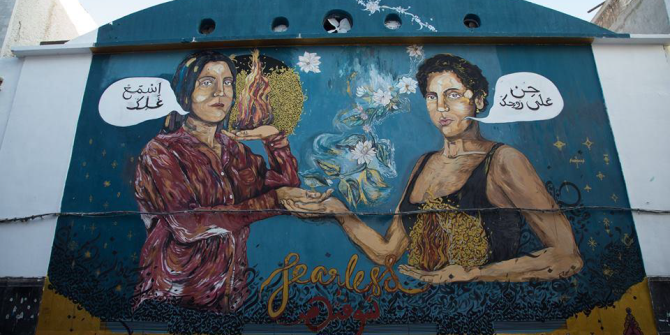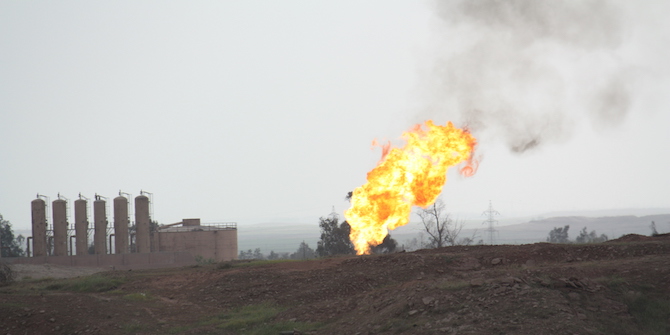By Nour Abu-Assab and Nof Nasser-Eddin
This blog and others in the series are based on presentations during a workshop organised by the LSE Middle East Centre on 26 February 2019.

Often, in mainstream institutions, similar to the LSE and many other universities in the Global North, voices from the margin and the Global South are only allowed to be vocalised in ways similar to those of informants, rather than knowledge producers. The Sexualities and LGBT Activism in the Middle East and North Africa workshop did the opposite. Due to our awareness of what such institutions represent, we decided to shed light on the marginalisation of intersectional feminist knowledge, within academic institutions and in civil society activism. In our talk, ‘Transnational Reflections on Women-led Organising around Gender and Sexuality’, we refused to provide descriptions about ourselves and our experiences, as queer women from Arabic-speaking countries. Instead, we discussed the systematic silencing of certain women’s voices and of discourses that reject mainstream, hegemonic western narratives -especially when it comes to gender and sexuality studies from and about the Global South.
The panel intentionally comprised of women from Arabic-speaking countries, thanks to the organisers of the one-day event. It was also particularly refreshing that all women on the panel addressed the need to produce context and language-specific forms of knowledge around gender and sexuality in the region, and in the Global South more broadly. Our talk shed light on the importance of creating discourses and narratives that centre people’s interpretation of their own realities and truths, while still demonstrating transnational linkages between struggles.
By doing so, we aimed to rethink transnational solidarities, in ways that do not compromise context-specificity. We also addressed the silencing of knowledge that serves to defy universalised narratives and bring to light structures of oppression that operate on a global level. Through examples, we demonstrated how such silencing occurs within different institutions, including academic disciplines, identity-based civil society organisations, mainstream state-affiliated feminist organisations, colonial institutions of states in the Global North, as well as male-led organisations. We aimed to expose both the colonial and patriarchal nature of silencing intersectional, political, decolonial feminist research -a process also reflected in the lack of funding for research that seeks to defy boundaries imposed by western hegemonies.
In this talk, we called for the adoption of queer intersectional feminist approaches to the production of different forms of knowledge. Queer research and knowledge production derives its importance, not from ‘queer’ as an identity category, but rather as a method and tool that disrupts the status quo of knowledge produced in and about Arabic-speaking countries. More often than not, such knowledge reinforces stereotypes rather than challenge structures of oppression. Queering knowledge pushes us to challenge these structures including, but not limited to, colonialism, patriarchy and capitalism, which are considered global phenomena. It also helps situate people’s lived experiences and material realities within those structures, instead of providing uncritical data whereby people are characterised as ‘exotic’, ‘different’ and ‘other’. Such descriptions treat individuals as the problem, instead of pointing to the structures that create differences in their material realities. Our arguments revolved around five examples of ways in which intersectional feminist research that disrupts mainstream knowledge production is discouraged. In this piece, we draw on two examples.
The first example demonstrated the ways in which organisations and initiatives that get the majority of funding for gender and sexuality work often reinforce western terminologies, namely LGBT identity categories that are depoliticised and decontextualised (See Nasser-Eddin, et. al, 2018). While our research demonstrates that in most cases, LGBT identity categories do not have resonance in Arabic-speaking countries, our findings are often ignored when presented to funders and organisations on the ground. For example, during a meeting with a policy maker from the Global North, we explained that the use of such LGBT language is not suitable in Arabic-speaking countries, as it overlooks people’s material realities, particularly the ways in which they relate to gender and sexuality in this case. His response was: “we [LGBT people] are many, and we are everywhere. There is no need change language.” Such assumptions are simplistic and oppressive to those who do not agree with the terminology, as well as those who have non-normative genders and sexualities but do not necessarily identify with identity categories and/or do not have access to such language. This imposition of universalised identity categories, a claim to an ‘LGBT’ nation across different contexts, silences feminist research that challenges such dominant discourses.
Another example of this silencing was when we carried out intersectional feminist research focused on the reasons behind women’s marginalisation within civil society groups and organisations. The criticism we received for this piece of research was that quotes from interviews were misleading and not representative, and that the language used was very ‘negative’. Such criticism was levelled at us due to the fact that the findings fundamentally questioned the existence of many civil society organisations that claim to be working on gender, while actually marginalising women through their practices. These examples demonstrate ways in which the silencing of feminist knowledge is patriarchal, imperialist, neoliberal and serves the agenda of the global elite, rather those who are marginalised. Also, such examples can certainly be drawn from other contexts, and are not limited to Arabic-speaking countries. Challenging this silencing requires us to rethink transnational feminist solidarities. In order to overcome the borders and boundaries imposed on feminist knowledge production, we need to stand together in solidarity without universalising and compromising intersectionality.
References:
Nof Nasser-Eddin, Nour Abu-Assab and Aydan Greatrick (2018) Reconceptualising and contextualising sexual rights in the MENA region: beyond LGBTQI categories. Gender and Development: Volume 25, issue: 1, 173-189.
Nour Abu-Assab is co-founder and co-director of the Centre for Transnational Development and Collaboration (CTDC). Nour is a queer Palestinian feminist sociologist, who was awarded a PhD in Sociology in 2012 from the University of Warwick, and has a forthcoming book in the making under the title of Queering Ethnicities and Nationalisms in the Middle East. Nour tweets at @Nour_Abu_Assab
Nof Nasser-Eddin is co-founder and co-director of the Centre for Transnational Development and Collaboration (CTDC). Nof is a queer Palestinian feminist sociologist, who was awarded a PhD in Sociology in 2011 from the University of Warwick. Nof has a number of publications in different academic journals focusing on refugee issues, intersectionality, class, gender, masculinities, sexualities and agency. She tweets at @Nof_NasserEddin
In this series:
- Sexualities and LGBT Activism in the Middle East and North Africa by Polly Withers
- Sexualities and LGBTQI+ Activism in Tunisia: the Example of the Feminist LGBT Movement Chouf by Silvia Quattrini and Bochra Triki
- A Reproductive Justice Framework for Queer Liberation: Perspective from Lebanon by Roula Seghaier
- Why do Gender and Sexuality Come Up so Often When we Discuss Immigration? by Mehammed Amadeus Mack






